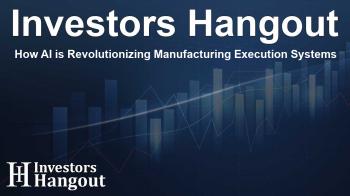How AI is Revolutionizing Manufacturing Execution Systems

Understanding the Impact of AI on MES
In recent years, Artificial Intelligence (AI) has emerged as a crucial driver of innovation within the machinery and manufacturing sectors. Manufacturing Execution Systems (MES) are being redefined through AI integration, evolving from simple process-monitoring tools to robust systems capable of intelligent decision-making. This transformation allows manufacturers to better predict outcomes, enhance machine performance, and achieve unprecedented levels of productivity.
The Evolution of Manufacturing Execution Systems
Transforming Traditional Processes
Traditional MES solutions have long been used to monitor and control production activities. However, these systems often lacked the ability to adapt and predict outcomes. Enter AI. By leveraging machine learning (ML) techniques, MES can now analyze extensive real-time data generated by machinery and production lines. This shift empowers manufacturers to identify patterns, foresee maintenance needs, and optimize workflows dynamically.
Predictive Maintenance Takes Center Stage
One of the primary advantages of embedding AI within MES is the capability for predictive maintenance. By analyzing sensor data, these systems can forecast when machinery is likely to fail. This foresight allows for timely maintenance scheduling during off-peak periods, significantly reducing unplanned downtime and associated costs. Consequently, manufacturers benefit from improved overall equipment effectiveness (OEE) and streamlined operations.
Changing the Manufacturing Landscape with Data
Data-Driven Decision Making
AI-driven MES plays a pivotal role in transforming raw data into actionable insights. By employing advanced algorithms, these systems can identify process inefficiencies and propose solutions. For example, when specific machines demonstrate consistent quality issues, the AI system can suggest recalibrations or adjustments, helping maintain product consistency and reduce waste.
Real-Time Quality Control
Quality assurance has also seen a significant evolution with AI integration in MES. Instead of relying solely on post-production inspections, AI allows for real-time monitoring of production quality. By utilizing high-resolution cameras and sensors, the system can detect defects early in the manufacturing process and address them immediately, thus maintaining high standards and customer satisfaction.
Sustainability and Energy Efficiency
The Green Manufacturing Movement
AI-powered MES is also paving the way for greener manufacturing practices. By analyzing production energy consumption patterns, AI identifies opportunities for energy savings, such as optimizing production schedules during off-peak energy hours. This not only reduces operational costs but also contributes to sustainability goals by minimizing the carbon footprint associated with manufacturing.
Resource Optimization
With AI’s capabilities, manufacturers can minimize material waste and enhance resource utilization, supporting their transition towards green manufacturing and the concept of Industry 5.0. By focusing on sustainability alongside productivity, companies can meet consumer demands for eco-friendly operations.
Diegesis: AI Enhancing Human Decision Making
Collaboration between Humans and Machines
AI does not replace human workers; instead, it enhances their decision-making capabilities. AI-driven MES systems provide operators with comprehensive insights, facilitating timely decisions that may avert production issues before they escalate. This collaboration allows human intuition to blend with machine intelligence, fostering a more efficient workplace.
The Future of Intelligent Manufacturing
Looking ahead, the integration of AI into MES will only become more pronounced. Future systems will offer not just execution and monitoring but also adaptiveness and self-optimization achieved in real-time. Manufacturers who embrace this technological revolution will be better positioned to thrive in a rapidly evolving market.
Frequently Asked Questions
How does AI enhance MES capabilities?
AI enhances MES by providing predictive analytics, improving decision-making, and enabling real-time monitoring, thus streamlining operations and reducing downtimes.
What role does AI play in predictive maintenance?
AI helps predict when machinery might fail by analyzing sensor data, facilitating timely maintenance and reducing unexpected breakdowns.
How does AI influence quality control in manufacturing?
AI enables real-time quality assessments, detecting issues early in the production process and ensuring adherence to quality standards.
What are the sustainability benefits of AI in manufacturing?
AI helps optimize energy uses and resource management, contributing to lower operational costs while supporting eco-friendly initiatives in manufacturing practices.
What does the future hold for MES in an AI-driven environment?
The future MES will be more autonomous, learning from operations and adapting to changes, thus enhancing efficiency and productivity in manufacturing processes.
About The Author
Contact Lucas Young privately here. Or send an email with ATTN: Lucas Young as the subject to contact@investorshangout.com.
About Investors Hangout
Investors Hangout is a leading online stock forum for financial discussion and learning, offering a wide range of free tools and resources. It draws in traders of all levels, who exchange market knowledge, investigate trading tactics, and keep an eye on industry developments in real time. Featuring financial articles, stock message boards, quotes, charts, company profiles, and live news updates. Through cooperative learning and a wealth of informational resources, it helps users from novices creating their first portfolios to experts honing their techniques. Join Investors Hangout today: https://investorshangout.com/
The content of this article is based on factual, publicly available information and does not represent legal, financial, or investment advice. Investors Hangout does not offer financial advice, and the author is not a licensed financial advisor. Consult a qualified advisor before making any financial or investment decisions based on this article. This article should not be considered advice to purchase, sell, or hold any securities or other investments. If any of the material provided here is inaccurate, please contact us for corrections.

